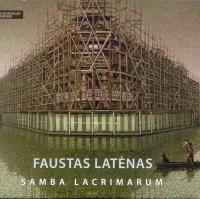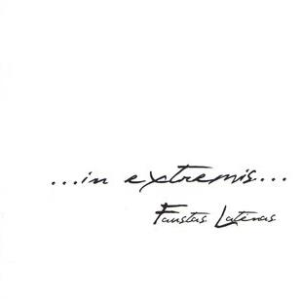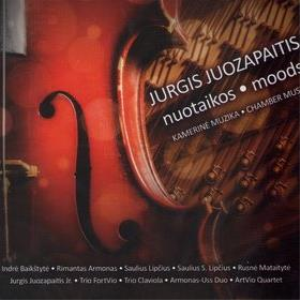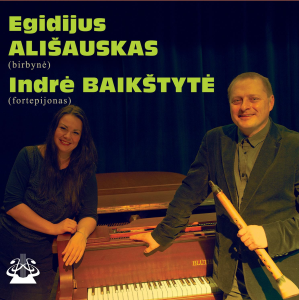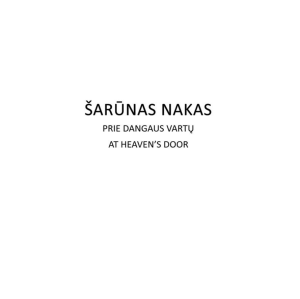
Indrė Baikštytė

Indrė Baikštytė is a representative of a famous family of Lithuanian musicians. Her grandfather was the composer Eduardas Balsys. Her mother is the pianist Dalia Balsytė. The young pianist was surrounded with music since early years; thus, her chosen profession is a natural continuation of family traditions.
Education
Born 01 05 1979 in Vilnius. In 1984 – 1993 she studied piano at the M.K.Čiurlionis Secondary School of Art, Vilnius (now National M. K. Čiurlionis School of Arts) with teacher Nijolė Kereševičienė, later, with Prof. Olga Šteinberg (1993-1997). Then she entered the Lithuanian Academy of Music and Theatre where she studied piano with Prof. Olga Šteinberg; in 2001 she graduated and in 2003 completed her MA in piano solo and accompaniment. In 2001/2002 she received the SOCRATES / ERASMUS stipend through an international exchange programme to study piano at the Universität der Künste, Berlin with Prof. Laszlo Simon. In 2005 she finished her practice based PhD studies at the LMTA (with Associated Prof. Irena Uss-Armonienė, Associated Prof. Dalia Balsytė and Prof. Petras Geniušas) and was awarded the art licenciate degree.
Competitions, Courses
I. Baikštytė has participated in piano competitions: 1996 S. Vainiūnas and L. Knezhkova-Hussey competitions (Canada, she won second prize at the latter), 1999 International M. K. Čiurlionis Piano and Organ Competition and International Competition “George Enescu” (Romania; she took first prize at the latter).
Other achievements: in 2000, first prize at the Pianists-Accompanyists Competition at the LMTA for the V. Landsbergis Fund Award; in 2002, second prize at the I Competition for Chamber Duos in Sweden (with violinist R.Lipinaitytė); in 2004, first prize at the competition-festival 21st c. Art in the Ukraine (Vorzel), accompanyists group; in 2005, first prize and the Landsbergis Fund Award at the International Pianists and Accompanyists Competition (professionals group), Vilnius.
In 2006 Indrė Baikštytė won the International Stasys Vainiūnas Piano and Chamber Ensemble Competition with the piano trio FortVio (Ingrida Rupaitė – violin, Povilas Jacunskas – cello). In summer 2006 the trio attended courses at the 16 Internationale Sommerakademie 06 Prag-Wien-Budapest with professors: A. Kouyoumdjian, S. Devich, F. Rados and P. Schuhmayer. During the courses the ensemble won an award for the exceptional performance of a Viennese classic opus and a special prize for the great interpretation of a chamber opus. In 2006 FortVio won third prize at the XIII International Johannes Brahms Competition in Poertschach (Austria).
In 2006 at the Beatričė Grincevičiūtė Chamber Singing Competition I. Baikštytė accompanied the singer Raminta Vaicekauskaitė: the soloist won the first prize, and the pianist took the Best Accompanyist of the Competition award.
Concerts
The pianist performs at concerts organised by the Lithuanian National Philharmonic together with the National Symphony and Lithuanian Chamber Orchestras. She has given solo recitals and performs both in Lithuania and abroad (Austria, Canada, France, Germany, Italy, Poland, Russia, Portugal, Romania and Sweden).
Indrė Baikštytė prepares chamber music programmes together with violinist Rūta Lipinaitytė. Since 2001 the duo has been known as Domino Duo. In 2002 the ensemble won second prize at the I Competition for Duos in Sweden. In 2002, together with this violinist I. Baikštytė participated in the Ost / West Festival in Wupertal (Germany). In 2003 the duo participated in the International Chamber Music Competition in Sanguinetto (Italy). The same year the duo successfully represented Lithuania at the International Youth Chamber Music Festival in Berlin.
She has given concerts together with famous Lithuanian conductors Saulius Sondeckis and Robertas Šervenikas, violist Gediminas Dačinskas, violinists Rūta Lipinaitytė and Martynas Švėgžda von Bekker, flutist Giedrius Gelgotas, cellist Povilas Jacunskas and Edvardas Armonas, vocalists Raminta Vaicekauskaitė, Joana Gedmintaitė, Asmik Grigorian, Kęstutis Alčiauskis and Ignas Misiūra-Tumanovas.
Employment
In summer term, 2002, and winter term, 2002 / 2003, the pianist was invited to work as a teaching accompanyist at the Fine Arts Faculty, Singing Department, Anke Eggers class, Universität der Künste Berlin.
At the moment the pianist works as an accompanyist at the Lithuanian Academy of Music and Theatre and National M. K. Čiurlionis School of Arts. At the National M. K. Čiurlionis School of Arts Indrė Baikštytė teaches in the Accompaniment and Chamber Ensemble Departments. The pianist is a lecturer at the Accompaniment Department, Lithuanian Academy of Music and Theatre.
Lithuanian Composers
Feliksas Bajoras
Where Is the Father's Granary for voice and piano
Lullaby, for voice and piano
Suite of Stories, for voice and piano
Osvaldas Balakauskas
Like the Touch of a Sea Wave for violin and piano
Eduardas Balsys
Scene of Egle and Zilvinas from ballet "Egle, Queen of the Grass-snakes"
Sonata
„Habanera“ for viola & piano
Kazys Viktoras Banaitis
All Through the Night I Have Been, for voice and piano
Vytautas Barkauskas
Sonata „Subita“ for violin and piano
Justinas Bašinskas
The Rivulet Flows, for voice and piano
Maidens' Bench Bended, for voice and piano
Sarbinčiula ogėla, for voice and piano
Mikalojus Konstantinas Čiurlionis
The Sea (VL 255) fragment from the symphonic poem for piano
Balys Dvarionas
„Scherzino“
Reverie. Elegy for piano and violin
A Star for piano and violin
Gavotte for violin and piano
Nocturne for violin and piano
A Starlet, for voice and piano
Pine-trees, for voice and piano
Juozas Gruodis
Mother-in-law's song for voice and piano
Poppies for voice and piano
Oh, upon the Hill (Ulijona), for voice and piano
Spring Night in Berlin, for voice and piano
Juozas Indra
Sun is Going Down, for voice and piano
Jurgis Juozapaitis
I will Blossom like the Wormwood, for voice and piano
Julius Juzeliūnas
Sonata for violin and piano (1972)
Aleksandras Kačanauskas
How Lovely, for voice and piano
Faustas Latėnas
Sonata (1983) for violin and piano
Sonata for flute and piano (1977)
„Pasodoblis“ for viola and piano (1988)
Anatolijus Šenderovas
Songs of Sulamite
Stasys Šimkus
Lithuanian folk song arrangement for voice and piano
Juozas Tallat-Kelpša
My Heart Celebrates Today, for voice and piano
Stasys Vainiūnas
Trio
Eight Moods, Op.43 for piano
Chamber Works
Ludwig van Beethoven
Trio in D major op. 70 No.1 („Geister Trio“)
Johannes Brahms
Hungarian Dances No. 2, 5 for Piano trio
Trio in B major, op. 8
Joseph Haydn
Trio in C major Hob XV:21
Trio in G major Hob XV:25
Sergei Rachmaninov
Elegy
Dmitri Shostakovich
Trio in E minor, op.67
P. Teffanel
Andante Pastorale et Scherzettino for flute & piano in G minor
Voice and Piano
Alban Berg
Early Songs (7), for voice & piano (or orchestra)
Ruperto Chapi
“I am Coming from Spain” from the zarzuela Jewish Boy
Gerónimo Giménez
“Mountain Ridges of Granada” from the zarzuela La tempranica
Enrique Granados
„Gracia mia“
„No lloreis ojuelos“
„Descúbrase il pensamiento de mi secreto cuidado“
P. Luna
“I am Coming from Spain” from the zarzuela Jewish Boy
Gustav Mahler
Funf Lieder nach Ruckert / Five Ruckert Lieder
Fernando Obradors
„Trova“
„El Molondrón“
„Canción del café de Chinitas“
„Romance de los pelegrinitos“
„Al Amor“ words by Christóbal de Castillejo
„En el Pinar“
„Corazón porque pasais...“
„El majo celoso“
„Con amores la mi madre...“
„El Tumba y lé“
„Del cabello mas sutil...“
„Coplas de Curro Dulce“
Franz Schubert
Gretchen am Spinnrade ("Meine Ruh'..."), song for voice & piano, D. 118 (Op. 2)
Ständchen ("Leise flehen meine Lieder"), song for voice & piano (Schwanengesang), D. 957/4
Der Tod und das Mädchen ("Vorüber, ach vorüber"), song for voice & piano, D. 531 (Op. 7/3)
Die Forelle ("In einem Bächlein helle"), song for voice & piano, D. 550 (Op. 32)
Du bist die Ruh, song for voice & piano, D. 776 (Op. 59/3)
Heidenröslein ("Sah ein Knab..."), song for voice & piano, D. 257 (Op. 3/3)
Robert Schumann
Frauenliebe und - leben, Op. 42
Dichterliebe, Op. 48
Federico Moreno Torroba
“La petenera” from the zarzuela La Marchenera
Joaquín Turina
Poema en forma de canciones, for voice & piano (or orchestra), Op. 19
Saeta en forma de salve a la Virgen de la Esperanza, for voice & piano (or orchestra), Op. 60
Poems (3), for voice & piano, Op. 81
Richard Wagner
Wesendonk Lieder, songs (5) for voice & piano (or orchestra), WWV 91
Hugo Wolf
Fussreise ("Am frischgeschnittnen Wanderstab"), song for voice & piano (Möricke Lieder)
Im Frühling ("Hier lieg ich"), song for voice & piano (Möricke Lieder)
Lebe wohl ("Lebe wohl! Du fühlest nicht"), song for voice & piano (Möricke Lieder)
Nimmersatte Liebe ("So ist die Lieb!"), song for voice & piano (Mörike Lieder)
Heimweh ("Anders wird die Welt"), song for voice & piano (Möricke Lieder)
Verborgenheit ("Lass, o Welt, o lass mich sein"), song for voice & piano (Möricke Lieder)
Das verlassene Mägdlein ("Früh, wann die Hähne krähn"), song for voice & piano (Möricke Lieder)
Solo Works
Johann Sebastian Bach
English Suite, for keyboard No. 3 in G minor, BWV 808 (BC L15)
Ludwig van Beethoven
Sonata No. 26 Les adieux/Lebewohl in E flat major, op. 81a
Piano Sonata No. 8 in C minor ("Pathétique"), Op. 13
Sonata No. 13 Quasi una fantasia in E flat major, op. 27/1
Frederic Chopin
Ballade for piano No. 3 in A flat major, Op. 47, CT. 4
Sonata No. 2 in B flat minor, Op. 35, CT. 202
Polonaise-fantasy for piano No. 7 in A flat major, Op. 61, CT. 156
Claude Debussy
L'Isle joyeuse
Joseph Haydn
Sonata in C major, Hob.:XVI/50
Wolfgang Amadeus Mozart
Sonata No. 16 in C major, KV 545
Sonata No. 19 in D major, KV 576
Rondo for Piano & Orchestra KV 382
Sergei Prokofiev
Sonata No. 5 in C major, op. 38
Romeo and Juliet, pieces (10) for piano, Op. 75
Maurice Ravel
Tombeau de Couperin
Jeux d'eau
Robert Schumann
Novelettes (8) No. 1, 2, 8 op. 21
Works for Cello and Piano
Max Bruch
Kol Nidrei, for cello & orchestra, Op. 47
Claude Debussy
Sonata for cello & piano, L. 135
Anton Dvorak
Silent Woods (Klid), for cello & orchestra (arr. from From the Bohemian Forest, B. 133), B. 182 (Op. 68/5)
Astor Piazzolla
„Grand Tango“
David Popper
Elfentanz for cello & piano, Op 39 "Dance of the Elves"
Sergei Prokofiev
Sonata for cello & piano in C major, Op. 119
Robert Schumann
Adagio & Allegro for horn (or violin or cello) & piano in A flat major, Op. 70
Dmitri Shostakovich
Sonata for cello & piano in D minor, Op. 40
Works for Violin and Piano
Johann Sebastian Bach
Sonatas BWV 1014-19
Béla Bartók
Rhapsody for violin & piano No. 1, Sz. 86, BB 94a
A. Bazini
Rondo des Lutins op. 25
Ludwig van Beethoven
Romance No.2 in F major op. 50
Sonata for violin & piano No. 8 in G major, Op. 30/3
Sonata for violin & piano No. 7 in C minor, Op. 30/2
Sonata for violin & piano No. 5 in F major, „Spring”, op. 24
Johannes Brahms
Sonata for Violin & Piano No. 2 in A major ("Thun"), Op. 100
Sonata for Violin & Piano No. 3 in D minor, Op. 108
Ernest Chausson
„Poem“ op.25
Claude Debussy
Sonata for violin & piano, L. 140
Anton Dvorak
Romantic Pieces (4) for violin & piano, B. 150 (Op. 75) (rev. of Miniatures, B. 149)
George Enescu
Sonata for violin & piano No. 3 in A minor ("dans le caractere populaire roumain"), Op. 25
Manuel de Falla
Danza Espanola, for orchestra (from "La Vida Breve")
Cesar Franck
Sonata for violin & piano in A major, M. 8
Edvard Grieg
Sonata No. 2, in G major, Op. 13
Sonata No. 1 , in F major, Op. 8
Paul Hindemith
Sonata in E flat major op. 11/1
Bohuslav Martinu
Sonata No. 1
Wolfgang Amadeus Mozart
Sonata in A major, KV 305
Sergei Prokofiev
Sonata for violin and piano No. 1 in F minor op.80
Sergei Rachmaninov
Vokalise
Maurice Ravel
"Tzigane", Rapsodie de concert, 1924
Sonata in G major
Camille Saint-Saens
Introduction and Rondo Capriccioso, for violin & orchestra in A minor, Op. 28
Variations on a original theme op. 15
Pablo de Sarasate
Habañera from Bizet's "Carmen"
Alfred Schnittke
Sonata for violin & piano No.1
Igor Stravinsky
Suite Italienne, for violin & piano (after Pulcinella, transcribed with Samuel Dushkin)
Henryk Wieniawski
Scherzo-tarantelle, for violin & piano in G minor, Op. 16
Fantaisie brillante sur Faust op. 20
Polonaise (No. 1) de concert, for violin & orchestra in D major, Op. 4
Légende, for violin & orchestra (or piano) in G minor, Op. 17
Polonaise in A major op. 21 No. 2
Eugène Ysaÿe
Elegiac poem in D minor op.12
W. A. Mozart. Adagio E-dur KV 261
Concert at the Lithuanian National Philharmonic Hall, December 5, 2009
To mark the 90th anniversary of composer EDUARDAS BALSYS
Suite from the ballet Egle, Queen of the Grass-snakes
Reflections of the Sea for string orchestra
Dramatic Frescoes for violin, piano and orchestra
To mark the 90th anniversary of composer EDUARDAS BALSYS
LITHUANIAN NATIONAL SYMPHONY ORCHESTRA
Soloists:
RŪTA LIPINAITYTĖ (violin)
INDRĖ BAIKŠTYTĖ (piano)
Conductor JUOZAS DOMARKAS
Concert in Museum of Applied Art, February 8, 2009
"Crazy for Love"
FEDERICO MORENO TORROBA
“La petenera” from the zarzuela La Marchenera
PABLO LUNA
“I am Coming from Spain” from the zarzuela Jewish Boy
RUPERTO CHAPI
“Song of a Warder” from the Madrilenian farce Daughters of Zebedeo
GERÓNIMO GIMÉNEZ
“Mountain Ridges of Granada” from the zarzuela La tempranica
FERNANDO J. OBRADORS
From collections Classical Spanish Songs: “The Clumsy One”, “Poem”, “Romance of Pilgrims”, “In the Pine Forest”, “From the Softies Hair…”, “Couplets of Sweet Narcissist “
ENRIQUE GRANADOS
“My Gracious”, “Don’t Cry, Dear Eyes”, “Forgive My Secret Expectations”
JOAQUÍN TURINA
“Chant”, “When Such a Beauty Looked at You”, “Desires”, “Poem in a Form of Song”, “Dedication”, “Not Forgotten”, “Songs”, “Two Fears”, “Crazy for Love”
RAMINTA VAICEKAUSKAITĖ (soprano)
INDRĖ BAIKŠTYTĖ (piano)
Concert at the Thomas Mann Festival, Nida, Evangelic Lutheran Church, 07 17 2007
J.Haydn Piano Trio in C major, Hob XV:21
D. Shostakovich Piano Trio No. 2 in E minor, op. 67
Enrique Granados (1867–1916) Gracia mia
Enrique Granados Descúbrase il pensamiento de mi secreto cuidado
Fernando J. Obradors (1897–1945) ”Canciónes clásicas españoles“
El Molondrón
Romance de los pelegrinitos
En el Pinar
Coplas de Curro Dulce
Joaquín Turina Saeta
Joaquín Turina Anhelos
Joaquín Turina Poema en forma de canciones:
Cantares
Los dos miedos
Las locas po amor
Raminta Vaicekauskaitė (soprano), Piano Trio „FortVio“: Indrė Baikštytė (piano), Ingrida Rupaitė (violin), Povilas Jacunskas (cello)
Concert in Klaipeda, 06 13 2007
Raminta Vaicekauskaitė (soprano) and Indrė Baikštytė (piano)
Fernando J. Obradors (1897–1945). Songs from cycle „Canciónes clásicas españoles“:
1. ”Trova“
2. ”El Molondrón“
3. ”Canción del café de Chinitas“
4. ”Romance de los pelegrinitos“
5. ”Al Amor“ words Christóbal de Castillejo (XVII c.)
6. ”Corazón porque pasais...“ (XVII c.)
7. ”En el Pinar“
8. ”El majo celoso“ (XVIII c.)
9. ”Con amores la mi madre...” words Juan Anchieta (XV c.)
10. ”El Tumba y lé“
11. ”Del cabello mas sutil...“
12. ”Coplas de Curro Dulce“
Intermission
1. Enrique Granados (1867–1916). ”Gracia mia“ words anonym
2. Enrique Granados. ”No lloreis ojuelos“ words Lope de Vega
3. Enrique Granados. ”Descúbrase il pensamiento de mi secreto cuidado“
4. Joaquín Turina (1882–1949). words D. Francisco Rodriguez Marín:
”Anhelos“
”Vade Retro!“
”A unos ojos“
5. Joaquín Turina. ”Saeta“ words S. J. A. Quintero
6. Joaquín Turina. ”Homenaje a Lope de Vega“:
”Cuando tan hermosa os miro...“
”Si con mis deseos...“
”Al val de Fuente Ovejuna...“
7. Joaquín Turina. words Ramon de Campoamor:
”Dedicatoria“
”Nunca olvida“
”Cantares“
”Los dos miedos“
”Las locas po amor“
Concert in the Lithuanian National Philharmonic Hall, January 24, 2007
Sergiu Natra "Trio in one movement" No. 2 (Lithuanian premiere)
Ludwig van Beethoven Piano Trio in D major, Op. 70 No. 1 ("Geister Trio")
Faustas Latėnas Sonata for violin and piano
Cesar Franck Sonata for violin and piano in A major
Notes:
Aleksandras Štarkas (violin), Indrė Baikštytė (piano), Edmundas Kulikauskas (cello)
Concert in Museum of Applied Art, 02 25 2006
Igor Stravinsky Italian Suite (from the ballet "Pulcinella")
George Enescu Sonata for violin and piano No. 3 in E minor, Op. 25 (“In Romanian Style”)
Manuel De Falla Spanish Suite
Olivier Greif Indian Raga
Maurice Ravel Concert Rhapsody "Tzigane"
DOMINO DUO: RŪTA LIPINAITYTĖ (violin), INDRĖ BAIKŠTYTĖ (piano)
Piano Duo Recital "A Journey Around the World"
Edward Elgar- "CHANSON DE NUIT" op 15, for viola and piano
Rūta Lipinaitytė and Indrė Baikštytė appeared as professionals worthy of each other during their concert from the series Returns (Sugrįžimai). Both were remarkable for their sensitivity to music and each other; they managed to be great soloists and play in ensemble impeccably.
Jurgita Skiotytė, “Festivalyje du skirtingi duetai” (“Two Different Duos in the Festival”), 7 meno dienos, 24 05 2002
Both performers are personalities full of youthful strive and energy. All opuses performed during the concert showed the Domino Duo as a lively chamber ensemble, open to creative experimentation and with a potential to seek other summits of performance.
Zita Abromavičiūtė, “„Domino duo pavasarinėje LMTA scenoje” (“Domino Duo in the Spring Hall of the LMTA”), Muzikos barai, 05 04 2004
Among the factors decisive in the successful debut of M. Švėgžda and I. Baikštytė’s duo is the subordination of both musicians who adequately understand the role of their violin and piano parts. This characteristic, as it is well known, takes a long time to form and mature through systematic rehearsals, accumulating experience, and does not always show during debut concerts when musicians want so much to prove the importance of their skill. Thus, when accompanying to the programme of virtuoso opuses I. Baikštytė has discovered an appropriate space for her outstanding skills in this area to unfold without the fear to remain in the soloist’s shadow. She has polished the observation of style, harmony, phrase-response and thematic continuity subtly and precisely, thus creating a great opportunity for the violinist’s sense of freedom and artistic intentions to flourish, and without them, it would be difficult to imagine the typical style of M. Švėgžda.
Vytautė Markeliūnienė, “Smuikininko Martyno Švėgždos von Bekkerio ir pianistės Indrės Baikštytės rečitalis Vilniaus rotušėje” (“The Recital of Violinist Martynas Švėgžda von Bekker and Pianist Indrė Baikštytė in Vilnius City Hall“), 7 meno dienos, 16 12 2
A good professional preparation of both musicians, perfect taste and sense of style, manifested when they were performing a Sonata by Beethoven. A suitably chosen tempo, the sound range and a good sense of ensemble were delightful. The latter quality became particularly apparent in Gipsy Melodies by P. Sarasate: the sensitive and meaningful accompaniment of piano did not restrain the flight of violin. We had an opportunity to admire the perfect technique of Indrė Baikštytė, her wide range of timbre, sound and professional attitude to the variety of ensemble performance moving from chamber performance to accompaniment.
Aušra Motuzienė, “Džiuginantys savitumu - Iš „Sugrįžimų″ festivalio dienoraščio” (“Delightful Originality: From the Diary of the Returns Festival”), 7 meno dienos, 05 05 2006
The performers in the concert were three talented Lithuanian musicians, laureates of many international competitions: Martynas Švėgžda von Bekker (violin), Povilas Jacunskas (cello) and Indrė Baikštytė (piano) who joined to play trio for the first time. <...> From the very first sounds we were plunged into the sea of romantic feelings when subtle whispers were replaced by wild outbursts, mournful melancholy, by triumphant precipitation. The musicians conveyed each of these changes with skill and sensitivity (I emphasise the word ‘sensitivity’): an aerobatics, which is difficult to express verbally.
